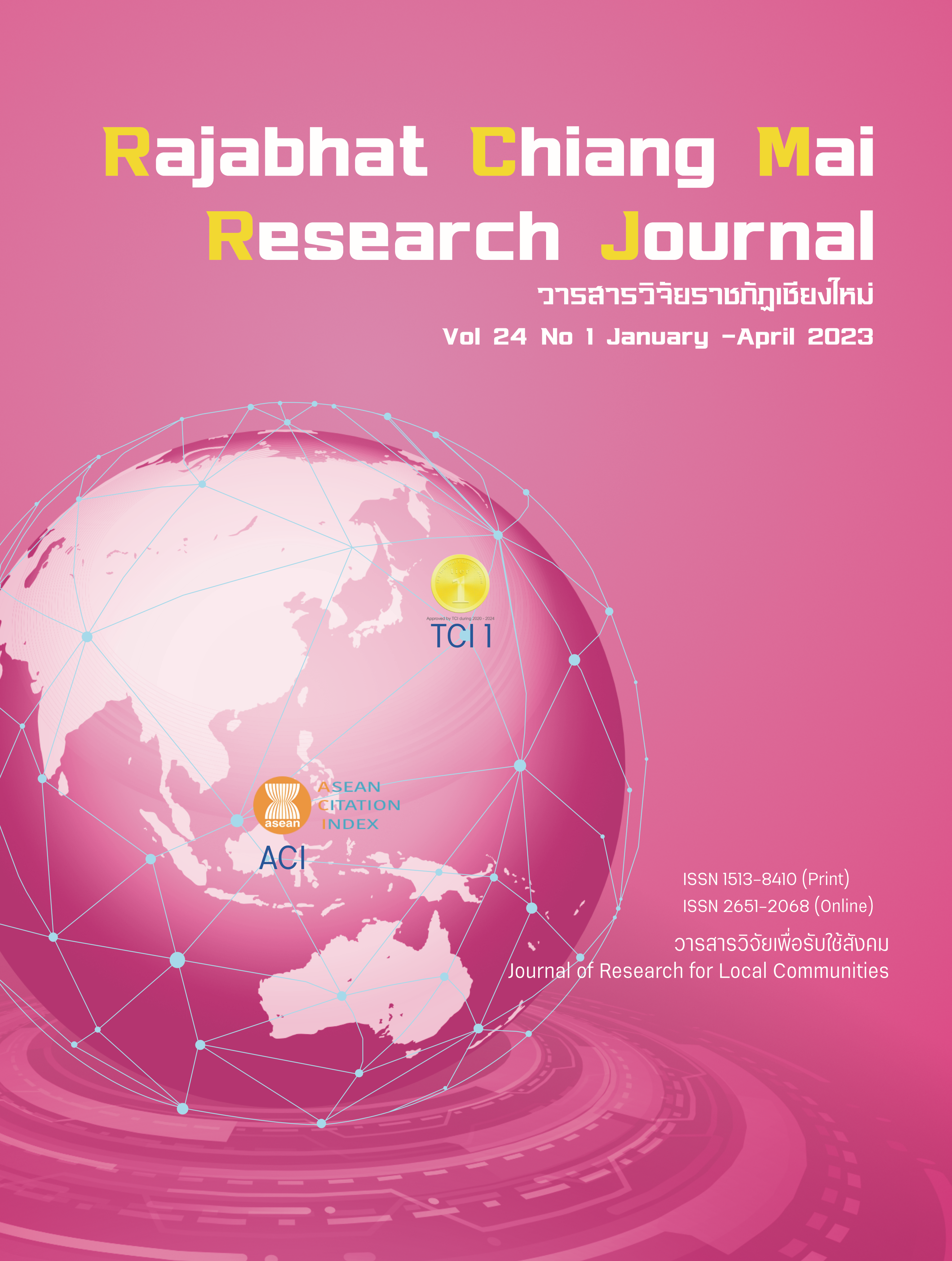Results of Psychological Training Program To Develop Children and Youth Mainstays for Immune-Strengthening and Surveillance of Family Violence in Children and Youth in Chiang Rai
DOI:
https://doi.org/10.57260/rcmrj.2023.262557Keywords:
Training, Psychology, Immune-strengthening, Violence, Children and youthAbstract
This experimental research aimed to study the result of the psychological training program to develop children and youth mainstays for immune-strengthening and surveillance of family violence in children and youth in Chiang Rai. The sample group was the youth in Chiang Rai aged 15-25 years who had the average score from the questionnaire about the violence in families of children and youth in Chiang Rai from the 75th percentile. The purposive sampling method was used to select 60 samples to participate in the psychological training program by conducting a match pair of children and youth whose averages were similar: 30 youth to the experimental group and 30 youth to the control group. The psychological training program was conducted twice a week, 1.30 to 2 hours each session, five sessions in total within three weeks. The operational step included three stages: Initial, Working, and Ending Stage.
Research results demonstrated that the mean of family violence in children and youth in Chiang Rai from the experimental group during the pre-test period was 3.54 and the Standard Deviation (SD) was 0.65, which was high. The mean of family violence and SD during the post-test period was 2.63 and 0.34, which was moderate. The mean of family violence and SD during the post-test period was 2.56 and 0.33, which was moderate. As for children and youth from the control group, the mean of family violence and SD during the pre-test was 3.86, and SD was 0.48, which was high. The mean of family violence, and SD during the post-test period was 3.82 and 0.50, which was high. During the follow-up stage, the mean of family violence and, SD was 3.80 and 3.48, which was high. It proved that the program was successful to some extent due to the increasing mean of family violence.
Downloads
References
Baker, A. C., & Absenger, W. (2013) Sexual Wellness Enhancement and Enrichment Training (SWEET): A hypothetical group model for addressing sexual health and wellbeing, Sexual and Relationship Therapy, 28(1-2), 48-62. https://doi.org/10.1080/14681994.2013.770142
Chafetz, M. D. (2008). Malingering on the social security disability consultative exam: predictors and base rates. The Clinical neuropsychologist, 22(3), 529–546. https://doi.org/10.1080/13854040701346104
McGarrigle, T., & Walsh, C. A. (2011). Mindfulness, self-care, and wellness in social work: Effects of contemplative training. Journal of Religion & Spirituality in Social Work: Social Thought, 30(3), 212–233. https://doi.org/10.1080/15426432.2011.587384
Ministry of social development and human security. (2016). Data centers. Violence against children. Women and violence in the family. Retrieved from https://www.msociety.go.th/main.php?filename=index
Nelson-Jones, R. (1992). Group Leadership: A Training Approach. California: Brook/Cole.
Noosorn, N., & Phetphoom, C. (2016). Developing a Motivational and Prevention Programs Based on Self Efficacy Theory for Reducing the Risk Associated with Illegal Drug Use by Children and Youth Living in Border Area of Tak Province. EAU Heritage Journal Science and Technology, 10(3), 177–187. https://he01.tci-thaijo.org/index.php/EAUHJSci/article/view/64963 (In Thai)
Osborn, M., Broadfoot, P., Planel, C., & Pollard, A. (1997). Social Class, Educational Opportunity and Equal Entitlement: Dilemmas of Schooling in England and France. Comparative Education, 33(3), 375–393. http://www.jstor.org/stable/3099497
Phillips, K., Brockman, R., Bailey, P. E., & Kneebone, I. I. (2019). Young Schema Questionnaire - Short Form Version 3 (YSQ-S3): Preliminary validation in older adults. Aging & mental health, 23(1), 140–147. https://doi.org/10.1080/13607863.2017.1396579
Schmidt, J. J. (1993). Counseling in Schools: Essential Service and Comprehensive Programs. Boston: Allyn & Bacon.
Shaffer, J. B. P., & Galinski, M. D. (1974). Models of group therapy and sensitivity training. Englewood Cliffs, NJ: Prentice-Hall.
Siriratrekha, T. (2022). Foster Home Camp Activities. Bangkok. (In Thai)
Sodsri, S. (2017). The Problem of Family Violence in Thai Society. Journal of MCU Peace Studies, 6(Special Edition), 600-609. https://so03.tci-thaijo.org/index.php/journal-peace/article/view/116657/94918 (In Thai)
Stevens, J. P. (2002). Applied multivariate statistics for the social sciences. Mahwah, NJ: Lawrence Erlbaum.
Tabitha, L.Y., Rebekah, R., Talunja, E., & Jonathan, H. O. (2013). Personal Growth Groups: Measuring Outcome and Evaluating Impact. The Journal for Specialists in Group Work, (38)1, 52-67. https://doi.org/10.1080/01933922.2012.745915
The Bureau of Registration Administration, Department of Local Administration. (2017). Official statistics registration. Retrieved from https://stat.bora.dopa.go.th/stat/statnew/statMONTH/statmonth/#/mainpage
Thompson, K.A. (2016). Counseling techniques: Improving relationships with others, ourselves, our families and our environment. (3rded.). New York: Routledge.
Timur, H., Kokanalı, M. K., Topçu, H. O., Topçu, S., Erkılınç, S., Uygur, D., & Yakut, H. İ. (2016). Factors That Affect Perinatal Outcomes of the Second Pregnancy of Adolescents. Journal of pediatric and adolescent gynecology, 29(1), 18–21. https://doi.org/10.1016/j.jpag.2015.05.002
Treven, S., Treven, U., & Zizek, S.S. (2015). Training Programs for Managing Well-being in Companies. Naše gospodarstvo/Our economy, 61(4), 23-31. https://doi.org/10.1515/ngoe-2015-0015
Downloads
Published
How to Cite
Issue
Section
License
Copyright (c) 2023 Rajabhat Chiang Mai Research Journal

This work is licensed under a Creative Commons Attribution-NonCommercial-NoDerivatives 4.0 International License.
1. Articles, information, content, images, etc published in the “Community and Social Development Journal” are copyrighted by the Community and Social Development Journal, Chiang Mai Rajabhat University. In order to properly distribute the articles through print and electronic media, the authors still hold the copyright for the published articles under the Creative Commons Attribution (CC BY) license, which allows the re-distribution of the articles in other sources. References must be made to the articles in the journal. The authors are responsible for requesting permission to reproduce copyrighted content from other sources.
2. The content of the articles appearing in the journal is the direct responsibility of the article authors. The editorial board of the journal does not necessarily agree with or share any responsibility.














